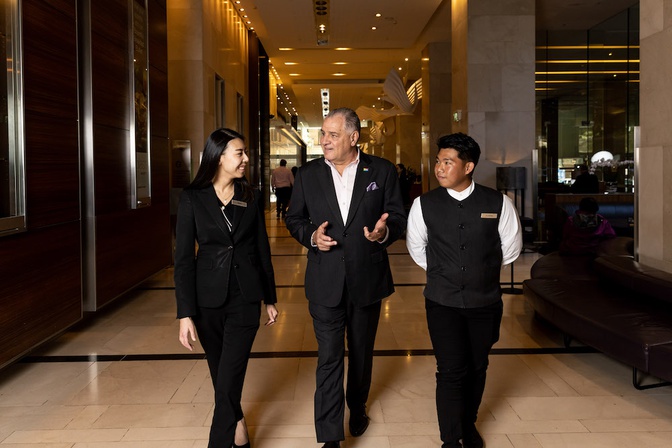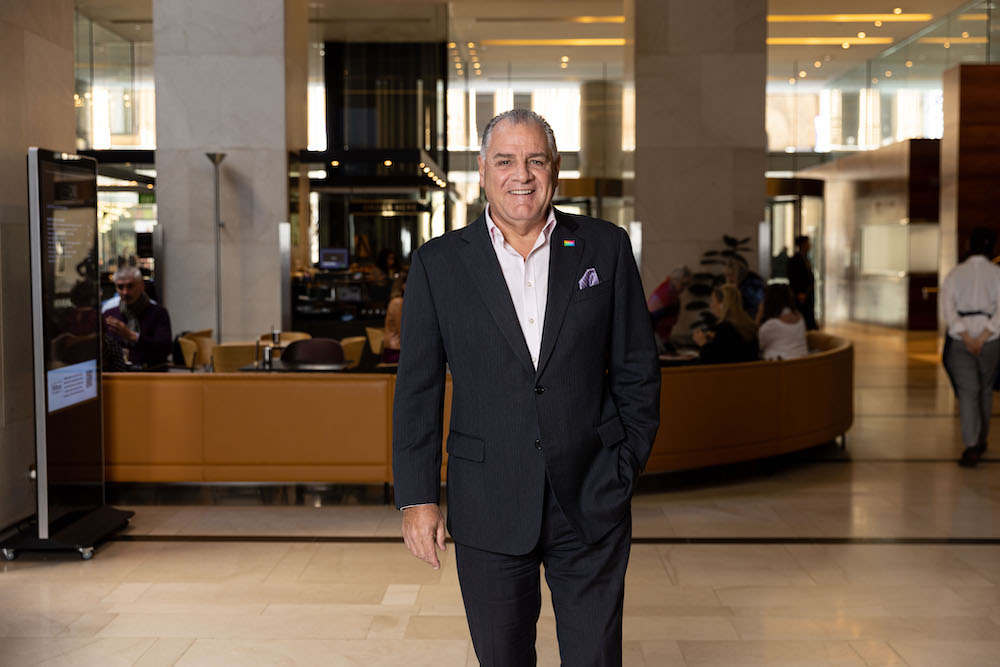You learn a lot about an industry when you spend 40 years working in it. We catch up with Paul Hutton, Hilton’s head of Australasia, to hear what makes the brand tick and why it’s still thriving after a century of operating.

What defines a hospitality institution? Some might say sustained popularity, others would say an intangible value that a venue adds to a city’s culture, or the number of years a business has been trading. That final point is critical, because sustaining popularity and contributing significantly to a city’s culture takes time.
How much time? Five, 10 or 20 years? There are plenty of venues labelled as institutions (and rightly so) that have traded for a quarter of a century. So, what do you call a hospitality brand that’s been in business for more than 100 years?
In this case, you’d call it Hilton. The international hotel brand has been trading since 1919 and has operated in Australia since opening its first hotel in 1960 in Sydney. We caught up with Paul Hutton – the head of Hilton in Australasia – to learn more about the brand’s history and find out why he’s worked there for more than 40 years.
From a young age, Hutton was spending a lot of time in hotels thanks to his father, who worked as a travelling diplomat. This planted the hospo seed in Hutton’s head and gave him a wealth of experience to draw from when he entered the industry – even if he didn’t necessarily realise it at the time.
“I started out in a traineeship at the Hilton in Geneva as a fairly naive eighteen-year-old. I was drawn-in simply by this passion I had for hotels – there’s a kind of romance, mystery and mystique about hotels that I’ve always been intrigued by, and that hasn’t changed.”
Hutton used his traineeship as a launch pad to take on roles in different aspects of the business in a range of countries around the world. He’s worked in service positions, operations roles, management and head office roles in countries such as Switzerland, Australia, UAE, Kuwait, China, Romania, Egypt, Malaysia, Singapore and more. Now the Head of Australasia, Hutton credits his progression and 40-year tenure to the pedigree that Hilton offers employees.
“There's a great balance between ambition and ability here. We have 425,000 employees across 7200 hotels in 125 countries – there's so much scope to get work in so many different fields here” Hutton says. “And if you happen to do well then, of course, Hilton has the resources to reward you and help you progress. If you have ability and you’re resilient, you can really do anything here.”

The brand’s pedigree has extended into Australia, where it’s now into its seventh decade of operating. Starting in Potts Point in 1960, with the famed Chevron Hilton, Hilton eventually expanded to Melbourne in 1974 and Sydney CBD (where Hutton worked as a restaurant manager) one year later, with Adelaide and Brisbane following shortly afterwards. Hutton credits Hilton’s Australian success as an employer to the brand’s reputation and the stability that comes with it.
“We’re originally an American brand with a long history and a name that’s known internationally. I think people are drawn to that as a workplace because they know, firstly that the company will still be around in a year – particularly post-covid – and obviously the size of it gives people so many avenues to pursue in their career.”
With more than 100 years of experience around the world, it would be hard to argue against the idea that Hilton has become a hospitality institution. There are a number of factors that now contribute to the brand’s success not only as a place to visit, but a place to work. Scale, resources and a global network are all key to Hilton’s pedigree as an employer in 2023.
That pedigree is one that the brand has earned, though. Hutton explains what the catalyst for Hilton’s success was prior to the business being a global name.
“The ethos of Hilton’s founder, Conrad Hilton, always revolved around the warmth and light of hospitality. He always believed that most of the world’s problems could be solved if people would sit down and have a cup of tea or coffee,” Hutton says. “Now, that’s oversimplifying things a little, but I think the state of mind behind that message formed the basis of the great hospitality that still resonates with all at Hilton today."
Hutton has been a part of the Hilton story for most of his life, so he’s seen plenty of prosperous times and tough eras in hospo. With the world constantly changing and hospitality continually evolving to keep up with travel trends and dining demands, Hutton says that growth has stayed consistent at Hilton.
“Coming out of a pandemic, we’re opening 120 hotels in the Asia Pacific region. A year before a hotel opens, we’re already hiring staff and training them in other locations, teaching them anything from running plates and cooking food to managing hundreds of employees,” Hutton says. “The growth here has been consistent from day one, even when things seem uncertain in the world. I think that’s what attracts people to work here and makes Hilton one of the most stable and progressive places to work, in any industry or country.”
This article is produced by Scout Jobs in partnership with Hilton
Photography: Katje Ford



